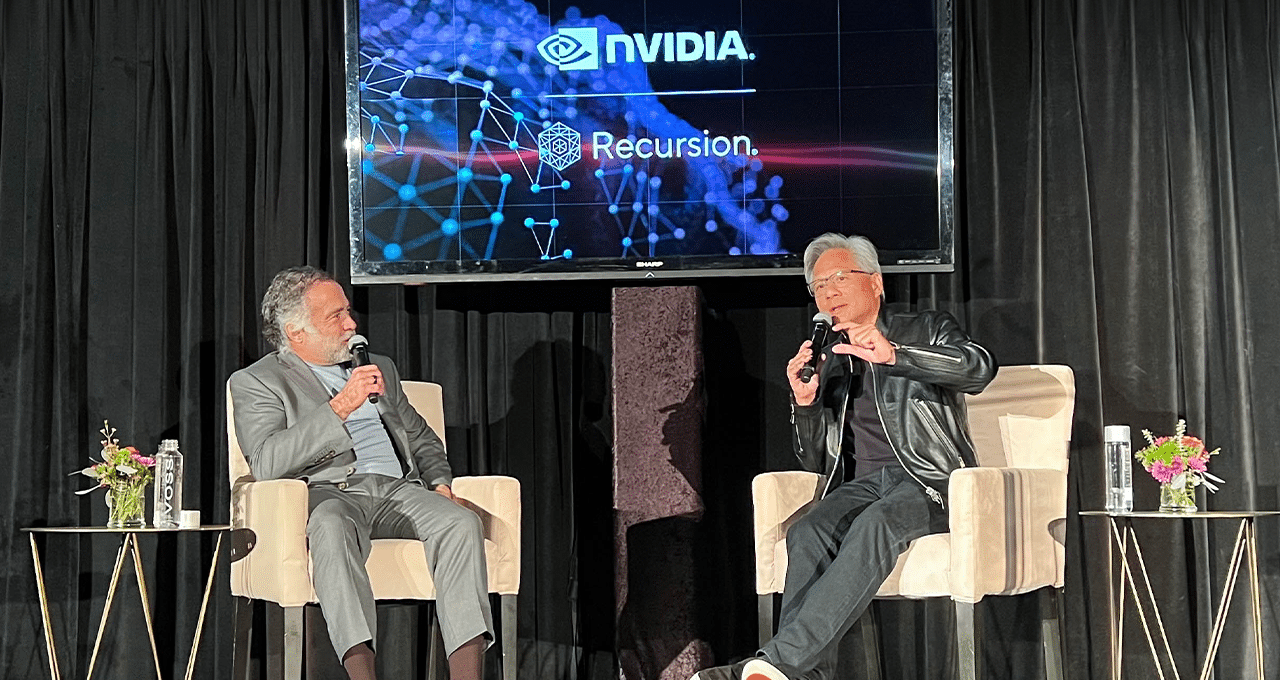“This year, every industry will become a technology industry,” NVIDIA founder and CEO Jensen Huang told attendees Wednesday during the annual J.P. Morgan Healthcare Conference.
“You can now recognize and learn the language of almost anything with structure, and you can translate it to anything with structure — so text-protein, protein-text,” Huang said in a fireside chat with Martin Chavez, partner and vice chairman of global investment firm Sixth Street Partners and board chair of Recursion, a biopharmaceutical company. “This is the generative AI revolution.”
The conversation, which took place at the historic San Francisco Mint, followed a presentation at the J.P. Morgan conference Monday by Kimberly Powell, NVIDIA’s VP of healthcare. In her talk, Powell announced that Recursion is the first hosting partner to offer a foundation model through the NVIDIA BioNeMo cloud service, which is advancing into beta this month.
She also said that Amgen, one of the first companies to employ BioNeMo, plans to advance drug discovery with generative AI and NVIDIA DGX SuperPOD — and that BioNeMo is used by a growing number of techbio companies, pharmas, AI software vendors and systems integrators. Among them are Deloitte, Innophore, Insilico Medicine, OneAngstrom, Recursion and Terray Therapeutics.
From Computer-Aided Chip Design to Drug Design
Healthcare customers and partners now consume well over a billion dollars in NVIDIA GPU computing each year — directly and indirectly through cloud partners.
Huang traced NVIDIA’s involvement in accelerated healthcare back to two research projects that caught his attention around 15 years ago: one at Mass General tapped NVIDIA GPUs to reconstruct CT images, another at the University of Illinois Urbana-Champaign applied GPU acceleration to molecular dynamics.
“It opened my mind that we could apply the same methodology that we use in computer-aided chip design to help the world of drug discovery go from computer-aided drug discovery to computer-aided drug design,” he said, realizing that, “if we scale this up by a billion times, we could simulate biology.”
After 40 years of advancements in computer-aided chip design, engineers can now build complex computing systems entirely in simulation, Huang explained. Over the next decade, the same could be true for AI-accelerated drug design.
“Almost everything will largely start in silico, largely end in silico,” he said, using a term that refers to an experiment run on a computer.
Collaborating on the Future of Drug Discovery and Medical Instruments
With the progress made to date, computer-aided drug discovery is “genuinely miraculous,” Huang said.
NVIDIA is propelling the field forward by building state-of-the-art AI models and powerful computing platforms, and by collaborating with domain experts and investing in techbio companies.
“We are determined to work with you to advance this field,” Huang said, inviting healthcare innovators to reach out to NVIDIA. “We deeply believe that this is going to be the future of the way that drugs will be discovered and designed.”
The company’s pipelines for accelerated healthcare include algorithms for cryo-electron microscopy, X-ray crystallography, gene sequencing, amino acid structure prediction and virtual drug molecule screening. And as AI advances, these computing tools are becoming much easier to access, Huang said.
“Because of artificial intelligence and the groundbreaking work that our industry has done, we have closed the technology divide in a dramatic way,” he said. “Everybody is a programmer, and the programming language of the future is called ‘human.’”
Beyond drug development, this transformation to a software-defined, AI-driven industry will also advance medical instruments.
“A medical instrument is never going to be the same again. Ultrasound systems, CT scan systems, all kinds of instruments — they’re always going to be a device plus a whole bunch of AIs,” Huang said. “The value that will create, the opportunities you create, are going to be incredible.”
For more from NVIDIA at the J.P. Morgan Healthcare Conference, listen to the audio recording and view the presentation deck of Powell’s session.
Learn about NVIDIA’s AI platform for healthcare and life sciences and subscribe to NVIDIA healthcare news.
Explore generative AI sessions and experiences at NVIDIA GTC, the global conference on AI and accelerated computing, running March 18-21 in San Jose, Calif., and online.
